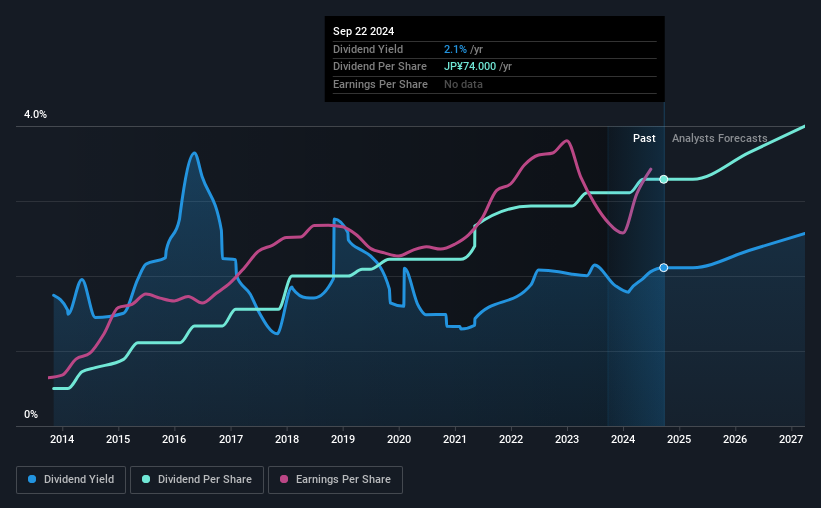Should You Buy JCU Corporation (TSE:4975) For Its Upcoming Dividend?

Regular readers will know that we love our dividends at Simply Wall St, which is why it's exciting to see JCU Corporation (TSE:4975) is about to trade ex-dividend in the next three days. Typically, the ex-dividend date is one business day before the record date which is the date on which a company determines the shareholders eligible to receive a dividend. The ex-dividend date is of consequence because whenever a stock is bought or sold, the trade takes at least two business day to settle. This means that investors who purchase JCU's shares on or after the 27th of September will not receive the dividend, which will be paid on the 4th of December.
The company's next dividend payment will be JP¥37.00 per share. Last year, in total, the company distributed JP¥74.00 to shareholders. Looking at the last 12 months of distributions, JCU has a trailing yield of approximately 2.1% on its current stock price of JP¥3505.00. We love seeing companies pay a dividend, but it's also important to be sure that laying the golden eggs isn't going to kill our golden goose! So we need to check whether the dividend payments are covered, and if earnings are growing.
View our latest analysis for JCU
Dividends are typically paid from company earnings. If a company pays more in dividends than it earned in profit, then the dividend could be unsustainable. JCU paid out a comfortable 29% of its profit last year. That said, even highly profitable companies sometimes might not generate enough cash to pay the dividend, which is why we should always check if the dividend is covered by cash flow. Fortunately, it paid out only 32% of its free cash flow in the past year.
It's positive to see that JCU's dividend is covered by both profits and cash flow, since this is generally a sign that the dividend is sustainable, and a lower payout ratio usually suggests a greater margin of safety before the dividend gets cut.
Click here to see how much of its profit JCU paid out over the last 12 months.

Have Earnings And Dividends Been Growing?
Stocks in companies that generate sustainable earnings growth often make the best dividend prospects, as it is easier to lift the dividend when earnings are rising. Investors love dividends, so if earnings fall and the dividend is reduced, expect a stock to be sold off heavily at the same time. With that in mind, we're encouraged by the steady growth at JCU, with earnings per share up 6.2% on average over the last five years. Management have been reinvested more than half of the company's earnings within the business, and the company has been able to grow earnings with this retained capital. Organisations that reinvest heavily in themselves typically get stronger over time, which can bring attractive benefits such as stronger earnings and dividends.
Many investors will assess a company's dividend performance by evaluating how much the dividend payments have changed over time. JCU has delivered 21% dividend growth per year on average over the past 10 years. We're glad to see dividends rising alongside earnings over a number of years, which may be a sign the company intends to share the growth with shareholders.
To Sum It Up
From a dividend perspective, should investors buy or avoid JCU? Earnings per share have been growing moderately, and JCU is paying out less than half its earnings and cash flow as dividends, which is an attractive combination as it suggests the company is investing in growth. It might be nice to see earnings growing faster, but JCU is being conservative with its dividend payouts and could still perform reasonably over the long run. JCU looks solid on this analysis overall, and we'd definitely consider investigating it more closely.
Curious about whether JCU has been able to consistently generate growth? Here's a chart of its historical revenue and earnings growth.
A common investing mistake is buying the first interesting stock you see. Here you can find a full list of high-yield dividend stocks.
New: Manage All Your Stock Portfolios in One Place
We've created the ultimate portfolio companion for stock investors, and it's free.
• Connect an unlimited number of Portfolios and see your total in one currency
• Be alerted to new Warning Signs or Risks via email or mobile
• Track the Fair Value of your stocks
Have feedback on this article? Concerned about the content? Get in touch with us directly. Alternatively, email editorial-team (at) simplywallst.com.
This article by Simply Wall St is general in nature. We provide commentary based on historical data and analyst forecasts only using an unbiased methodology and our articles are not intended to be financial advice. It does not constitute a recommendation to buy or sell any stock, and does not take account of your objectives, or your financial situation. We aim to bring you long-term focused analysis driven by fundamental data. Note that our analysis may not factor in the latest price-sensitive company announcements or qualitative material. Simply Wall St has no position in any stocks mentioned.
About TSE:4975
JCU
Engages in the produces and sells chemicals, machines, and auxiliary equipment for surface treatment in Japan.
Flawless balance sheet with solid track record and pays a dividend.

